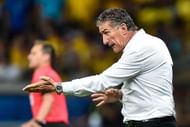It would be fair to say that there is a lot at stake for Argentina and Lionel Messi during the international break.
Argentina are fifth in the South American qualifying group for the 2018 World Cup, a position that would require them to win a playoff against the first-place team from Oceania (pretty much certainly New Zealand) to secure their place in Russia.
And while they are just a point off an automatic qualifying berth, the same distance separates them from failing to qualify at all.
Also Read: Sanchez reportedly fit to face Argentina
On Thursday, they host Chile, the side that defeated them in the finals of the 2015 Copa America and last year’s Copa America Centenario, before travelling to the altitude of La Paz to take on Bolivia next Tuesday. Given that Argentina’s final four fixtures include trips to Uruguay and Ecuador, they probably need to pick up at least four points, ideally six.
Inconsistency under Bauza
Edgardo Bauza has chopped and changed his system in his six matches in charge to date and that is likely to continue this time around, with a more attacking approach against Chile and a more defensive outlook in La Paz. But the results are the most important thing.
“Defeating Chile will be fundamental,” Bauza told La Nacion last week. “And I don’t care how it is achieved, as long as it is achieved.”
It would be fair to say the 59-year-old hasn’t yet convinced as Argentina coach. A record of two wins, two draws and two defeats (including a home loss to Paraguay), eight goals scored and eight conceded doesn’t read particularly favourably, while the comprehensive manner of his side’s 3-0 defeat away to Brazil last November certainly didn’t help his cause.
Also Read: Argentina players continue to shun reporters
But the subsequent victory over Colombia, in which barrel-chested striker Lucas Pratto provided a solid reference point around which Messi and Angel Di Maria rotated, renewed confidence and according to Bauza, saw him gain the trust of his charges.
And despite their current position, Bauza expects Argentina to qualify without the need to do so via an intercontinental playoff. He is already talking of winning the World Cup, imagining Messi lifting the trophy and wondering what there might be left for him to achieve afterwards.
Whether such pronouncements represent well-placed confidence or mere folly remains to be seen.
The last chance
What is clear is that the 2018 World Cup represents the last realistic chance for this current generation, many of whom were involved in the Under-20 World Cup wins of either 2005 or 2007, to achieve something together at senior level after reaching three consecutive finals without once being able to lift the major international trophy that has now eluded Argentina for going on quarter of a century (since their Copa America win in 1993).
The last of those defeats weighed particularly heavily on Messi, who missed a penalty in the shootout and afterwards briefly retired from international football. That he elected to return can be viewed as an acknowledgement that there is still something left for him and his colleagues to achieve at Russia 2018.
Bauza even believes Messi would still be capable of contributing in Qatar in 2022 if he had the desire to do so. But that is something that is likely to be conditioned by the quality of the supporting case available to the Barcelona forward.
Argentina’s recent performances at Under-20 level have left much to be desired. Since winning the 2007 World Cup at that level, they have twice failed to qualify and were unable to make it past the quarter-finals on the two occasions they did make it.
Also Read: Bauza insists overlooked Icardi still an option for Argentina
And of the country’s current clutch of talented players in their early twenties, only Mauro Icardi (not selected) and Paulo Dybala (selected) have truly consolidated themselves in Europe, although Angel Correa (selected) is steadily gaining importance at Atletico Madrid and Leandro Paredes (not selected) has enjoyed solid minutes at Roma this season.
Indeed, with the governance of Argentinian football in disarray, it is likely to be some time before a youth-team process as comprehensive and successful is that overseen by Jose Pekerman between 1994 and 2003 and continued by Hugo Tocalli through to 2007 is put into place.
And so if Messi wants to add a World Cup to his long list of career achievements, he and the other fruits of that process need to come together over the next week to lift Argentina out of their current predicament and set themselves on course towards Russia 2018.



